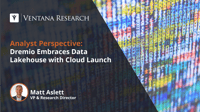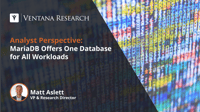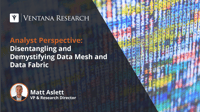I previously described the concept of hydroanalytic data platforms, which combine the structured data processing and analytics acceleration capabilities associated with data warehousing with the low-cost and multi-structured data storage advantages of the data lake. One of the key enablers of this approach is interactive SQL query engine functionality, which facilitates the use of existing business intelligence (BI) and data science tools to analyze data in data lakes. Interactive SQL query...
Read More
Topics:
business intelligence,
Analytics,
Cloud Computing,
Data,
Digital Technology,
data lakes,
data operations,
AI & Machine Learning,
Data Platforms,
Analytics & Data
I previously explained how the data lakehouse is one of two primary approaches being adopted to deliver what I have called a hydroanalytic data platform. Hydroanalytics involves the combination of data warehouse and data lake functionality to enable and accelerate analysis of data in cloud storage services. The term data lakehouse has been rapidly adopted by several vendors in recent years to describe an environment in which data warehousing functionality is integrated into the data lake...
Read More
Topics:
Analytics,
Business Intelligence,
Data,
data lakes,
Data Platforms
As I recently described, it is anticipated that the majority of database workloads will continue to be served by specialist data platforms targeting operational and analytic workloads, albeit with growing demand for hybrid data processing use-cases and functionality. Specialist operational and analytic data platforms have historically been the since preferred option, but there have always been general-purpose databases that could be used for both analytic and operational workloads, with tuning...
Read More
Topics:
Analytics,
Business Intelligence,
Cloud Computing,
Data,
Digital Technology,
Data Platforms,
Analytics & Data
I recently wrote about the potential benefits of data mesh. As I noted, data mesh is not a product that can be acquired, or even a technical architecture that can be built. It’s an organizational and cultural approach to data ownership, access and governance. While the concept of data mesh is agnostic to the technology used to implement it, technology is clearly an enabler for data mesh. For many organizations, new technological investment and evolution will be required to facilitate adoption...
Read More
Topics:
Analytics,
Business Intelligence,
Data Governance,
Data Integration,
Data,
data operations,
AI & Machine Learning,
Data Platforms,
Streaming Data & Events













